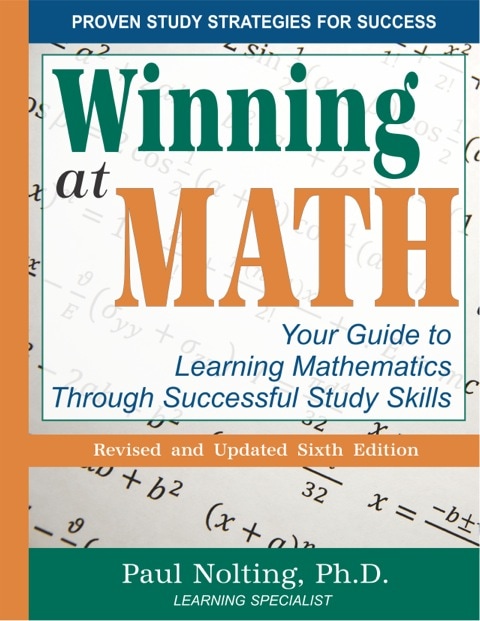Dr. Paul Nolting's Academic Success Press Blog: A Publication Dedicated to Math Success |
DR. PAUL NOLTING'S ACADEMIC SUCCESS PRESS BLOG
|
Post Author: Kim Nolting
As part of an ongoing effort to aggregate and discuss outstanding scholarship published within the past few years on math and math learning, we thought we'd quickly highlight a fascinating article published in 2012 in Consciousness and Cognition. Weger, Hooper, Meirer and Hopthrow explore effects of stereotype threat, the pressure resulting from social comparisons that are perceived as unfavorable, The authors focus on women performing math tasks in the academic setting, specifically on math assessments intended to measure gender differences. The study hypothesizes that a five-minute state mindfulness intervention would counteract the stereotype threat on the female participants, as demonstrated by higher performance of the participants receiving the intervention. [Note: “Mindfulness is characterized by a nonjudgmental awareness and attention to moment-by-moment cognition, emotion, and sensation without fixation on thoughts of the past and future.” State mindfulness is a short-term mindfulness accomplished through a mindfulness intervention, while trait mindfulness is more stable over time. (Kiken, Garland, Bluth et.al., 2015). (Kiken, Garland, Bluth et.al., 2015). ] These researchers support their investigation based on the following research. First, for more than a decade, research has established that individuals who perform within a context where they feel stereotype pressure underperform. Many individuals allow evoked emotions from this stereotype pressure to reside in them, turning the messages of the stereotype into their own self-assessment. Second, the emotive energy used in reaction to stereotype threats comes from the same source in the brain as cognitive energy, specifically working memory. The experience of stereotype threat also steals energy away from the brain’s ability to attend to a task systematically and efficiently. Third, Weger and et.al base their experiment on research, which has shown that working memory capacity mediates the effect of stereotype threat on a woman's performance in a math test. Fourth, state mindfulness intervention has been established as a powerful tool to help individuals monitor and constrain negative emotions and thoughts during a specific task and use endogenous attentional control. State mindfulness is a psychological construct “in which individuals experience their environment by focusing on the present in an unbiased and non-judgmental way,” (Weger & et.al, 2012). A drawback to trait mindfulness interventions is the length of time it requires and the detailed logistics. Thus, the researchers in this study set up a 2 (intervention: mindfulness vs. no mindfulness) x 2 (Stereotype threat: activated vs. not activated) design. Seventy-one female psychology students took part in the study. Researchers addressed several possible interfering variables in their design. Researchers used a well-established five-minute state mindfulness task, using a pre-recorded audio file that guides students through the process of eating two raisins. The intervention is designed to encourage participants to strengthen awareness of the present and to “drop in” on their actual lived experience, and then sustain it as best they can. All participants completed the first math test, then the intervention group completed the five-minute mindfulness intervention while the other participants simply ate two raisins. The stereotype group was told the second math test was to explore why males are better than females in math. Then all participants took the second math test, followed by the Toronto Mindfulness Scale test. The group difference test scores (mindfulness vs control group) revealed a main effect of mindfulness. The mindfulness group performed better on the second test than the control group. The predicted interaction of mindfulness and stereotype threat was significant in that the participants in the threat group performed significantly better on the second test after the mindfulness intervention than the non-mindful control groups. Read the article for other findings. In the discussion, researchers noted that the mindfulness intervention was just five minutes, something which can easily be completed in the classroom. Only the students’ willing to exercise control could influence the outcomes. It appears that the mindfulness intervention allowed students to dissociate the threatening cues they receive from stereotype pressure and reinterpret the cues so they can have a more positive motivation to show their strengths. In addition, the mindfulness intervention allowed students to use more working memory since it no longer had to combat as many negative emotions from stereotype pressure. Our Response We know that with practice, good behaviors can become habit. So many of our students have years of negative experiences due to bad habits only to become part of the vicious cycle of negative self-esteem, repeating bad habits and negative results. Even though we are instructors and not counselors, it does not take much time to participate in the training of state mindfulness interventions with the purpose of using them regularly with our students. The interventions must be based in state mindfulness to work, as seen in a previous article. We would like to hypothesize that helping students with state-mindfulness interventions that they can use on their own will encourage them to also use productive study skills, particularly when the math is challenging. This intervention can benefit all students, avoiding singling out those who are struggling. In fact, some students may be familiar with mindfulness practice because it has been integrated into many other contexts such as athletics and competition. Many people allow emotions and subsequent self-perceptions to define themselves. Pair this with actual external criticism and we hear many students say, “I’m just not good in math.” We do not have the time or expertise to counsel them, but we can help them minimize anxiety and increase focus when they are with us in the classroom. Weger, U.W, Hooper, N., Meirer, B. & Hopthrow, T. (2012). Mindful maths: Reducing the impact of stereotype threat through a mindfulness exercise. Consciousness and Cognition 21 471-475.
2 Comments
|
AuthorDr. Nolting is a national expert in assessing math learning problems, developing effective student learning strategies, assessing institutional variables that affect math success and math study skills. He is also an expert in helping students with disabilities and Wounded Warriors become successful in math. He now assists colleges and universities in redesigning their math courses to meet new curriculum requirements. He is the author of two math study skills texts: Winning at Math and My Math Success Plan. Blog HighlightsAmerican Mathematical Association of Two-Year Colleges presenter, Senior Lecturer-Modular Reader Contributions
|
Proudly powered by Weebly


 RSS Feed
RSS Feed